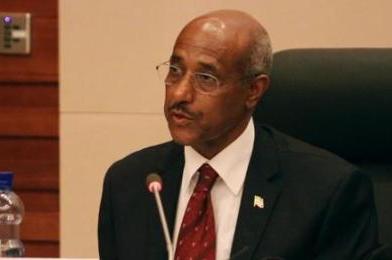East African peacekeepers to be deployed in S. Sudan: IGAD
March 9, 2014 (JUBA) – Five East African countries have expressed willingness to send peacekeeping troops to protect South Sudan’s oil field and other key installations, a mediator from the regional bloc (IGAD) said last week.

The regional bloc, in a statement issued last week, said it was in consultation with the African Union and United Nations over the proposed regional stabilisation force.
The new proposal, mediators argued, was part of the Monitoring and Verification Mechanism (MVM) of the South Sudanese crisis, which erupted in mid-December after a dispute among the presidential guards in the capital, Juba.
A South Sudanese official on Saturday vehemently denied an earlier report that Juba had requested the IGAD member countries to deploy troops to protect its oil fields.
Ateny Wek Ateny, the spokesperson for the presidency told Sudan Tribune that the proposal came from individual member countries of the East African regional bloc.
“What has been attributed to me to have said in Khartoum is incorrect. My statements were recorded and I have the audio. What has been said is not what I said. It is a misrepresentation of the statements I made before our ambassador and the other officials who were at the press conference with me,” Ateny clarified.
“I did not say the government of the republic of South Sudan had asked for deployment of troops from IGAD member countries. I said the government of the republic of South Sudan had received a proposal from individual IGAD member countries seeking to deploy troops to protect oil fields,” he stressed.
Ateny said his government was still studying the proposal before taking any decision.
PEACEFUL NEGOTIATIONS
About 10,000 people have reportedly been killed and nearly a million displaced when violence broke out in Juba and later extended to three of the country’s 10 states.
Since then, however, IGAD mediators led by Ethiopia’s Prime Minister Haile Mariam Desalegn have been trying to devise ways of ending the conflict, which saw a 23 January ceasefire deal it brokered violated by both warring factions.
South Sudanese rebels led by its former vice-president, Riek Machar have said a ceasefire could only hold, if Ugandan troops currently fighting alongside the South Sudanese army (SPLA) pull-out of the nearly three-months conflict.
Last month, the United States voiced similar concerns when it issues a strongly worded statement demanding the complete withdrawal of foreign troops involved in South Sudan, saying it contravened the cessation of hostilities deal.
Observers have expressed concerns that negotiations between South Sudan’s two warring parties have been slow, with little optimism for a break through, but the mediator on the contrary say “very good progress” had so far been made.
Both parties, according to IGAD’s special envoy, have agreed in principle to the “Declaration of Principles and framework for dialogue” that set the ground rules for denunciation of the violence that hit the country last year.
Meanwhile, a civil society conference is due on March 20 in the Ethiopian capital to get difference perspectives on the ongoing peace process.
A team of South Sudan’s ruling party (SPLM) leadership, officials say, was also expected to convene in Addis Ababa, to develop an agenda, modalities, and timeframe for review and self-assessment of the party.
Last week, the United Nations said it urgently requires $75 million to meet the needs of South Sudan’s displaced persons in the first six months of 2014.
(ST)
